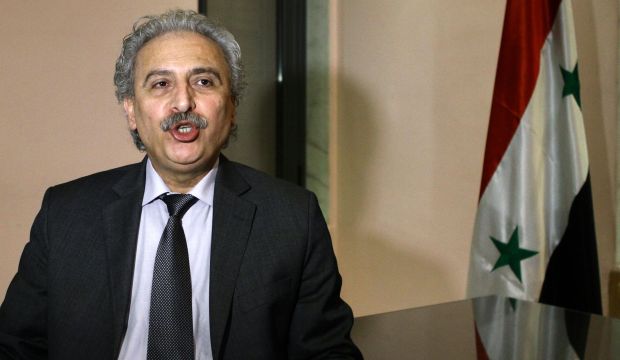
Louay Hussein, a leading Syrian intellectual and president and co-founder of the Syrian opposition movement Building the Syrian State (BSS) speaks during an interview in Damascus on March 3, 2015. (AFP/Louai Beshara)
Beirut, Asharq Al-Awsat—Syrian domestic opposition mainstay Louay Hussein has said that he took the decision to leave Syria after becoming convinced that the Assad regime is nothing more than a “militia” and is incapable of negotiating to reach a political solution to the Syrian crisis.
Speaking to Asharq Al-Awsat two weeks after fleeing Syria, Hussein, who heads the opposition Building the Syrian State (BSS) party, said: “The result of the regime’s militia-like mentality is that it is no longer able to enter negotiations or accept the opposition’s participation in power.”
He confirmed that Damascus has increased pressure on him and his party recently, along with other domestic opposition groups, as part of the regime’s message that greater opposition activity would not be tolerated.
The BSS party is part of Syria’s domestic opposition, tolerated to a certain extent by the Syrian government but viewed with suspicion by Syrian rebel groups outside of the country who see the group as collaborators with the Assad regime.
Hussein was arrested in November last year on charges of “weakening national sentiment” but was released on bail in February.
Earlier this month he evaded a travel ban and fled to Spain, just days before he was due to appear in court to hear the verdict in his case. Speaking immediately on his arrival in Spain, Hussein told international media that he took the decision to flee out of fear for his life.
“We must work to ensure that Syria remains a unified state after the regime has collapsed and brought the state to the edge of the abyss,” Hussein told Asharq Al-Awsat, pointing to the growing presence of the Islamic State of Iraq and Syria (ISIS).
Syrian opposition sources, speaking to Asharq Al-Awsat on the condition of anonymity, said that Hussein, a member of Bashar Al-Assad’s Alawite sect, could not play a further role in the political process from outside Syria.
Syrian rebels who have actively taken up arms against Assad are unlikely to embrace the controversial opposition figure who, until this year, had remained an active participant in the internal Syrian political process.
Hussein refused to outright confirm or deny whether he is involved in the internationally-backed process to resolve the Syrian crisis. He said: “There is some contact with some of the relevant states, but there has yet to be any serious talk in this context.”
The opposition leader indicated that his party would not look to challenge the Western-backed Syrian National Coalition. “We are not trying to be an addition to the Syrian opposition [abroad], nor will we seek to partner with the Coalition, but at the same time we will not seek to oppose it.”
“Our position is not one in opposition to the Syrian National Coalition, which we are continuing to communicate with. The situation requires active and effective understanding and coordination with the Coalition and some international states that are involved with the Syrian file,” he added.
